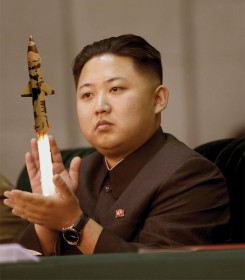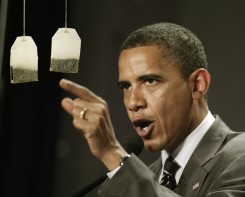The beginning of a new year is a time for celebration. In 2011, we saw some pretty major changes. There were mass protests in the Middle East, North America, and Europe, the death of dictators in Libya and North Korea; as well as a shift in Canada’s political landscape. 2012 will mean a fresh start. With an old adage about politics in mind – “if you’re right, you look like a genius. If you’re wrong, no one remembers” – it is time to make some predictions for what 2012 has in store politically.
Prediction No. 1: North Korea’s new shenanigans
The most recent change to the geopolitical landscape was the death of septuagenarian dictator and Hennessy enthusiast, Kim Jong-Il. The elder Kim has been replaced by his 27-year-old son, Kim Jong-Un, which makes him the youngest world leader ever to control nuclear weapons. Given his cloistered and opulent upbringing, it might be possible that Kim the Younger is not mentally stable. This might mean that, in a misguided display of strength, Kim will threaten the use of nuclear weapons against one of North Korea’s freer and more prosperous neighbours. This will trigger one of two events: 1) Kim Jong-Un is overthrown in a palace coup by the upper rungs of the military leadership who oppose his actions out of a desire for self-preservation or 2) North Korea is invaded by Japan and South Korea in an act of self-defense. Whether we would see a reunification of both Koreas if the second scenario occurred remains to be seen, considering the traditional divides between North and South.
Prediction No. 2: Canadian politics
With Harper heading a majority government and facing a leaderless opposition, it will be smooth sailing to get the Conservative agenda passed quickly and without much dissent. However, the NDP may see their political fortunes decline. The surge in support that made them the official opposition in 2011 will completely disappear if they do not prove themselves to be an effective opposition. With a caucus filled by rookie MPs primarily from Quebec, it will be no small task to bring discipline and a sense of professionalism to their ranks. Candidates with little parliamentary experience or who are accustomed to making inflammatory remarks will not be able to give Canadians a sense of confidence in the NDP. This is why, instead of the current front-runners Brian Topp or Thomas Mulcair, someone like Peggy Nash — moderate in rhetoric, with a history in the party and in parliament — will rise to the top and take the leadership, as she offers the best chance for the party to preserve its standing in future elections.
Prediction No. 3: Republicans in 2012
For many political junkies, the big story of 2012 is the race for the Republican nomination. Picking Obama’s challenger has been rife with short-lived frontrunners. These have included a cowboy governor, a pizza tycoon, and a disgraced former Speaker of the House. But the real story of 2012 won’t be who challenges Obama. It’s whom the President will deal with in Congress. With the rise of Senate candidates like Jeff Flake (R-Arizona) and Connie Mack (R-Florida), whoever the President is after November 4, 2012 there will be many spanners thrown into the works. Flake and Mack would be joining the likes of Rand Paul (R-Kentucky) and Mike Lee (R-Utah) as Tea Partiers who oppose massive federal spending and infringements on civil liberties. If Obama remains president, he will have both houses of congress under oppositional control. If the GOP take the White House, it won’t be a repeat of the unaccountability of the Bush years. Motivated by principle and backed by a disenfranchised movement largely outside the Republican Party apparatus, the Tea Party candidates will not take their marching orders from the political establishment. Even if the GOP manage not to take control of the upper house, the senators’ ability to filibuster will ensure that Flake, the leading opponent of earmarks in Congress, and Mack, a steadfast supporter of Wikileaks and civil rights, have their voices heard on the issues while frustrating the traditional power structures within both major parties.




